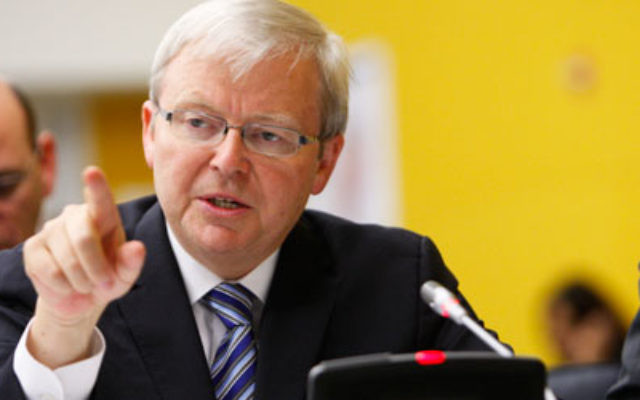Kevin Rudd’s election message
THE Australian Labor Party and the Coalition argue over many policy issues, and that is as it should be in a robust and open democracy such as ours. But some issues should be bipartisan, and I am pleased to say that on the subject of support for Israel and for the Middle East peace process, both major parties are in agreement.
THE Australian Labor Party and the Coalition argue over many policy issues, and that is as it should be in a robust and open democracy such as ours. But some issues should be bipartisan, and I am pleased to say that on the subject of support for Israel and for the Middle East peace process, both major parties are in agreement.
The government of Australia supports the State of Israel, not just as an ally, but as a friend. Well before the birth of the modern State of Israel, Australia has had deep ties with the Zionist dream. I am deeply proud of Australia’s historic links to the creation of the State of Israel and the enduring friendship that our nations have built in the last 65 years.
The Foreign Minister’s recent comments about the international legal status of Israeli settlements in the Occupied Territories in no way diminish my government’s support for Israel and for the peace process in which she is engaged. And it is my view that there is nothing to be gained from politicians publicly debating the finer points of international law in this immensely complex area.
The Australian government’s position on the conflict is clear. Let me reiterate here that Labor is committed to supporting an enduring and just two-state solution to the Israeli-Palestinian conflict, based on the right of Israel to live in peace within secure borders, internationally recognised and agreed by the parties, and reflecting the legitimate aspirations of the Palestinian people to also live in peace and security within their own state.
This is the position of the current Israeli government led by Prime Minister Netanyahu. It is the position held by successive governments of the United States – Democrat and Republican. And it is the position of successive Australian governments – Labor and Liberal.
Of course, the Australian government also recognises that Israel faces very real threats beyond those arising from its conflict with the Palestinians. We recognise the danger of destabilisation in the region, as evidenced in the recent upheavals in Egypt, and the ongoing and horrific conflict in Syria. And our government clearly understands the threat that a nuclear-armed Iran would pose to international peace and security, and particularly to Israel’s security.
For this reason my government continues to demand Iran comply with UN Security Council resolutions on its nuclear program.
Israel also faces threats of another kind from misguided programs such as the Boycott, Divestment and Sanctions (BDS) campaign.
The federal Labor government strongly opposes and publicly condemns the BDS. Our government expects all institutions in our society to behave in a manner that is ethical and appropriate, and Labor has made clear that in its view the BDS is neither .
While there is welcome bipartisanship on the subject of support for Israel, it is on domestic policies that some important differences between the Labor and the Liberal parties arise.
Our government is committed to the safety of Jewish students and their schools. After our election in 2007, federal Labor created the $20 million Secure Schools Program to help meet the security needs of schools at risk of racial, religious or ethnically motivated violence, property crime and harassment.
We allocated an additional $15 million to extend the program in 2010, and this month our government announced that the program would be extended for a third three-year term, and include a change to the eligibility criteria to enable funding for the provision of security guards for the first time.
However, it is on the subject of hate speech that there is the most obvious gulf between the Labor government and Liberal Opposition.
For almost 20 years, since the Racial Discrimination Act was enacted by the Keating government in 1994, Section 18C has embodied our nation’s condemnation of racial vilification, and protected our society from poisonous effects of hate speech. The Rudd Labor government strongly believes in the continued need for laws that prohibit racial hatred in Australia.
Tony Abbott has stated on several occasions his intent to repeal Section 18C, which makes it illegal to vilify people because of their race, colour or national or ethnic origin. Mr Abbott claims that the prohibitions in Section 18C are a threat to “intellectual freedom” and “freedom of speech” in Australia. One can only assume that the Coalition has an extremely poor grasp of history, and of the dangers of giving a green light to hate speech under the preposterous claim that racially vilifying people in public is necessary for people to enjoy intellectual freedom in our nation.
In contrast, Labor is committed to continuing to place the rights of all Australians to dignity and protection from racially motivated hate speech, ahead of the rights of bigots and extremists to say in public whatever they want.
Australian Labor remains committed to Israel, committed to the peace process, and committed to the values, polices and laws that make ours a truly prosperous, secure and multicultural nation.
By PRIME MINISTER KEVIN RUDD


comments